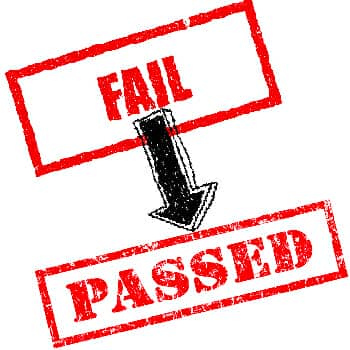 Tired of getting lower grades?
Tired of getting lower grades?
You should be.
You’re investing countless hours of your life.
Epic amounts of energy.
And every ounce of your being into your education.
Personally, I’ve always thought learners should be considered entrepreneurs precisely because your time, energy and tuition are precisely that:
An investment.
The problem is, there are many forces stacked against you.
Everything from health issues to unfair teachers.
I’ve faced a few myself, including professors trying to score points and even get revenge.
On the flip side of the coin, I’ve been a teacher myself, both at the high school and university levels.
So if you’d like my best tips on how to turn lower grades into completely success, read each and every word on this page. I’m going to show you how to never receive a failing grade again.
Why Are Your Grades Dropping? The Good, The Bad & The Ugly
I know what you’re thinking…
“The good? I know terrible grades are bad and ugly. But good?”
As a matter of fact, yes, a bad report card can be a good thing. For example, it’s a sign of at least some fairness in the system.
After all, if some people aren’t receiving lesser rewards when poor performance calls for a fail, then the teachers are not doing their job.
In order to cope with the fact that you might belong to the group that actually deserves bad grades, it’s important think reflectively and find ways to improve.
With that point in mind, here are some other reasons your grades might be plummeting. Then we’ll talk about some powerful solutions.
You’ve Started A New Grade Or More Challenging Program
I remember my first classes at university. They felt incredibly alienating.
Why?
Because it wasn’t anything like high school. Suddenly, the books we had to read were incredibly difficult. And the professors were speaking English, but it sounded like a completely new language.
Whether it was my sociology professor or the man at the chalkboard in psychology, a lot of the new vocabulary felt incredibly alienating for the first few days. I seriously doubted I would be able to succeed, especially since I didn’t know how to rapidly memorize new words back then.
Over the years as a student and professor, I’ve seen many students suffer failing grades because they never stop feeling like they’ve entered a world that’s too difficult for them to navigate.
Please don’t give up like so many others do. You can develop the mental strength to keep moving forward, and you’ll be tremendously proud of yourself when you do.
Your Expectations Need Proper Alignment
A lot of people struggle because they don’t understand the amount of time some topics require. That, or they aren’t able to deal with boring topics that most successful professionals have to deal with.
Take passing the bar exam as a lawyer, for example. The requirements are broad, and for many would-be lawyers, they have to study aspects of the law they will never use.
Expectations can be out of whack in other areas of your learning life too. For example, a lot of people who want to get good at chess need to take stock of what’s actually involved in making that dream a reality.
Or take language learning. When I recently passed level III in Mandarin as an adult learner, I need to put things in proper alignment in order to get my passing grade. My age, my other work duties and even the evening schedule of the class all influenced me. Because I aligned with them correctly (and used the tools taught in the Magnetic Memory Method Masterclass), I passed.
As long as your expectations are realistic, you’ll be fine. But if they aren’t, this could be a reason your academic performance is slipping.
Poor Note-Taking Habits
Students are rarely taught a wide enough variety of note-taking techniques.
That’s sad because there are many wonderful ways to study textbooks, use flashcards optimally and work with Anki.
Lifestyle & Health Issues
It’s common for students see their grades dropping when they ignore proper, memory-friendly sleep. Worse, they fill their diet with foods that actually harm memory.
Too much time online can also cause dopamine issues in your brain, including a problem known as digital amnesia.
Commitments That Make Time-Management Impossible
During my second year of university, I was struggling financially. I wound up taking three jobs at the same time: I worked at a photo lab (remember those?), a library and as a janitor at a movie theater.
As a result, I only had time for one course at the University of Northern British Columbia that year. My workload meant that I had a limited amount of study time. As a result, I progressed through my B.A. program much more slowly. I also wound up handing in some assignments that lacked the quality I was capable of because I was in a rush.
It was many years before I learned my lesson and crafted my lifestyle so that I could put the lion’s share of my focus on my studies.
So if you’re overcommitted and tired of seeing lower grades, chances are the freeing up your schedule as much as possible will do you wonders.
4 Memory Techniques to Improve Your Grades in School
The consequences of not removing the issues we’ve discussed above can be severe. Please make sure to address each of them where relevant to your life.
And keep guard in the future. It’s far too easy to lapse into complacency on these lifestyle factors, leading to procrastination and other difficulties.
But when you have those issues handled, you’ll have time and cognitive ability enough to use the following memory techniques. They’ll give you an even greater boost as you learn with greater ease.
One: The Memory Palace
A Memory Palace is a simple mental reproduction of a familiar location. It has helped countless students turn terrible grades into fantastic success.
Basically, you take a home or neighborhood and use it to place mnemonic images. These images help you recall the target information you need when taking exams.
For example, when I wanted to memorize facts about blood flow through the heart, I turned Lake Superior into a Memory Palace. Then I added the mnemonic image of Superman blowing on the lake to turn it to ice.
This is an ancient memory technique and well worth learning about. The sooner you start learning it, the sooner it will help you achieve top grades.
Two: Visualize While Reading
A quick trick you can use doesn’t have to involve the Memory Palace. Simply making associations while reading makes information stickier.
For example, I was recently reading about the medieval period and wanted to remember the dates for William the Conquerer.
If you don’t feel like you’re a visual learner, give these visualization exercises a try. Or, if you’re concerned that you have aphantasia and can’t visualize, here’s a suggested aphantasia cure that might help.
Three: Optimize How You Study
Many people struggle to remember information because they study in suboptimal ways.
A quick win is to have a look at exactly when and where you study. Merely by choosing better times and the best possible places to study, you will automatically start remembering more.
Four: Add More Advanced Memory Techniques
Once you’ve learned the Memory Palace technique, you’ll want to grow your skills.
Some of the more advanced memory hacks include:
Keep in mind that you can also use simpler memory tools too. I still like to use the extremely basic number rhyme system, for example.
Five: Use Proper Spaced Repetition
A lot of people talked about staged learning techniques spaced out over time. But few teach it correctly.
Here’s a tutorial on spaced repetition that digs deeply into what it is and why it works. Combine it with chunking and you’ll have better grades in no time.
4 Focus Tips to Help Your Concentration in Class
Now that we’ve covered some ways to optimize your memory for better grades, let’s dig into the topic of focus.
If you already start following all of the tips I’ve offered so far, you should already start to feel your mind focusing better.
To take things to the next level, follow these additional tips.
One: Set Clear Goals
If you’re struggling to find the main points when studying for exams, chances are you haven’t set learning goals as tightly as needed.
This can make it nearly impossible to focus. Here’s how to write effective learning goals so that you can.
As you’re setting your goals, keep timing in mind. Scheduling your time will also increase focus.
Two: Practice Concentration Meditations
I was lucky that a high school teacher introduced me to meditation in grade 11. Although I didn’t practice it in a committed way until years later, that early foundation served me well and I still feel its impact. It is impossible to exaggerate just how essential concentration is for learning.
The trick is to make sure that the meditations you practice work for you. Fortunately, you can check out my wide range of suggested concentration meditations for students and lifelong learners.
Three: Learn to Engage Yourself Without Blaming the Books
Crazy but true: many learners blame their books for being boring.
I cannot recommend this behavior. Success requires being able to deal with lots of tedious material. And there’s no sign of it going away anytime soon – if ever.
Fortunately, I’ve got dozens of articles on this blog to help you boost your reading skills. There are countless benefits to reading in the ways I teach, so if you’ve ever wanted to improve your memory for your studies, please check them all out.
Four: Build Your Resilience
I’m aware that it can be hard to get started with new learning tactics like we’ve studied today.
But that’s a huge part of the secret: just get started.
If you need help making your first moves, here are some mental training tips that will help you develop grit quickly. I couldn’t have gotten where I am today without them.
Finally, sometimes you have to combat grades where you know you deserved better. I’ve had to do that a few times.
It takes courage, but it’s important that you stand up for yourself if a teacher has assessed you incorrectly.
I hope you never feel attacked during a field exam or while defending a dissertation. That happened to me, and my best suggestion is this:
Use your mental resilience to keep calm and relaxed. If you can weather the storm, you’ll come up on top. In fact, your behavior will highlight the problem created by the examiner, helping you come out on top.
Remember: ABC. Always be cool.
Never Receive A Bad Report Card Again
I remember the last failed grade I saw on one of my report cards. It frustrated me so badly, I tore it to pieces.
Although I have a PhD now, shortly after tearing up the grade report, I dropped out of high school. How I got back to school and wound up going all the way to the doctor level is a long story, but the point is this:
I learned everything you’ve just discovered today. By taking consistent action with all of these tips, I managed to literally rewire my brain.
If you’d like more help doing the same, please get my FREE Memory Improvement Course:
It will help you master your studies quickly. In fact, it’s literally a masterclass in how to learn faster with worksheets and exercises.
From there, all you have to do is constantly think and operate in terms of optimized learning cycles.
Sure, this takes a bit of practice. But it’s worth it.
So what do you say?
Are you reading to say goodbye to dropping grades and hello to continual progress as you ace each and every exam?
Make it happen!
Related Posts
- Memory Loss Story And Memory Recovery Tips With Jennie Gorman
Memory loss is frightening. However, the solution may be simpler than you think. Jennie Gorman's…
- How to Improve Memory for Studying (9 Powerful Tips)
Want to know how to improve your memory for studying? From the Memory Palace technique…
- Delayed Gratification Tips For Memory Training With Matt Dobschuetz
If you don't have strategies for delaying gratification, you're robbing from your memory training efforts.…











